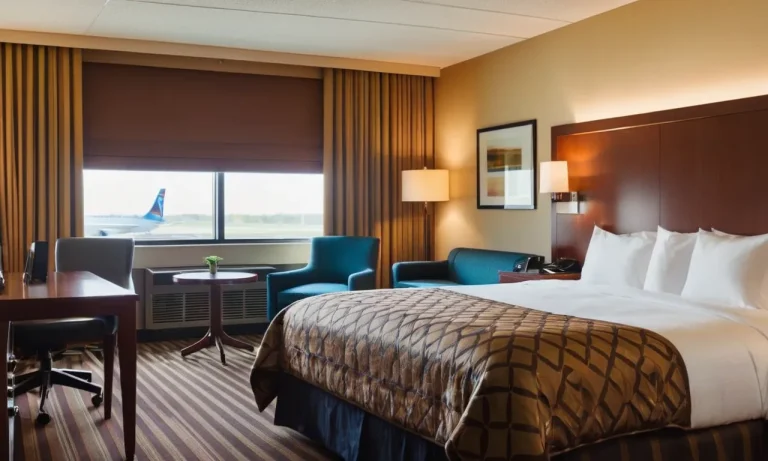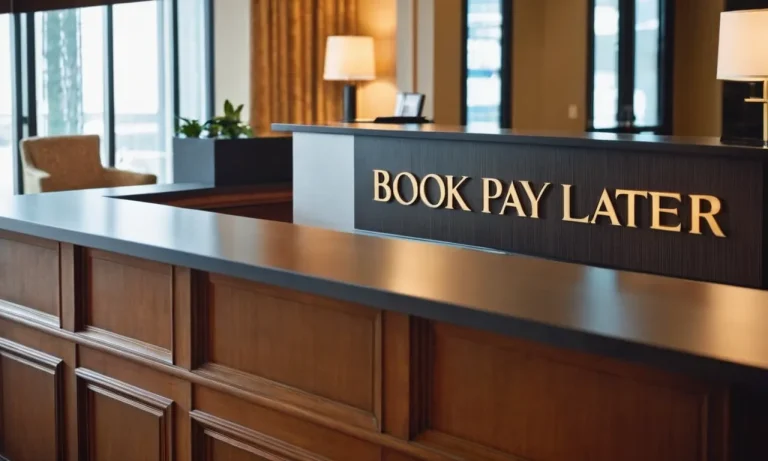How Late Can You Check Into a Hotel? A Comprehensive Guide
Imagine this: you’re on a long-awaited vacation or a crucial business trip, and you find yourself racing against the clock to reach your hotel. The question that lingers in your mind is, ‘How late can I check into a hotel?’
This dilemma is a common one, and the answer can vary depending on several factors.
If you’re short on time, here’s a quick answer to your question: Most hotels allow check-in until late at night, typically around midnight or even later, but the specific time can vary based on the hotel’s policies and local regulations.
In this comprehensive article, we’ll delve into the intricacies of hotel check-in times, exploring the factors that influence them, the exceptions to the rules, and the best practices to ensure a smooth and stress-free arrival.
Whether you’re a seasoned traveler or planning your first getaway, this guide will equip you with the knowledge to navigate the hotel check-in process with ease.
Standard Hotel Check-In Times
When it comes to checking into a hotel, timing is everything. Most hotels have a standard check-in time that guests are expected to adhere to. This helps ensure a smooth transition between guests and allows for proper room preparation.
But what exactly are these standard check-in times, and how do they vary across different hotels and locations? Let’s dive in and explore the world of hotel check-in etiquette.
Typical Check-In Hours
The typical check-in time for most hotels falls between 3:00 PM and 6:00 PM. This window allows hotels to thoroughly clean and prepare rooms for incoming guests after the previous occupants have checked out.
According to a study by Hotel Management, around 75% of hotels have a check-in time between 3:00 PM and 4:00 PM. This timeframe is widely accepted as the industry standard, giving guests ample time to arrive and settle in before the evening.
Variations Across Hotels and Locations
While the typical check-in time falls within the 3:00 PM to 6:00 PM range, there can be variations across different hotels and locations. For instance, luxury resorts or boutique hotels may have later check-in times, such as 5:00 PM or even 6:00 PM, to accommodate their high-end services and amenities.
On the other hand, budget-friendly hotels or motels may offer earlier check-in times, like 2:00 PM or even noon, to cater to travelers on a tighter schedule.
Additionally, the location of the hotel can also influence check-in times. Hotels in popular tourist destinations or business hubs may adjust their check-in times to accommodate peak travel periods or high occupancy rates.
For example, hotels in Las Vegas or Orlando may have later check-in times during busy seasons to ensure rooms are thoroughly cleaned and prepared for the influx of guests.
Factors Influencing Check-In Times
Several factors can influence a hotel’s check-in time, including staffing levels, occupancy rates, and housekeeping efficiency. Hotels with a larger staff and more resources may be able to offer earlier check-in times, while those with limited staff or high occupancy rates may need to push check-in times later to allow for proper room preparation.
Additionally, the type of hotel and its target market can play a role. Luxury hotels catering to high-end clientele may prioritize later check-in times to ensure a seamless and personalized experience, while budget hotels may aim for earlier check-in times to cater to cost-conscious travelers.
It’s always a good idea to check with your specific hotel regarding their check-in times and policies. Many hotels now offer mobile check-in or early check-in options for an additional fee, providing greater flexibility and convenience for guests.
Remember, being aware of the standard check-in times and communicating your arrival plans can go a long way in ensuring a smooth and enjoyable hotel stay. 😊
Late Check-In Policies and Procedures
Arriving late at a hotel can be a stressful experience, but with proper communication and understanding of the hotel’s policies, it can be a smooth process. Most hotels have established guidelines for late check-ins to ensure the convenience and safety of their guests.
Communicating Late Arrivals
The key to a hassle-free late check-in is communication. It’s essential to inform the hotel in advance if you plan to arrive after their designated check-in time, typically around 3 PM or 4 PM. Many hotels request that guests call or email to provide an estimated arrival time, especially if it’s after midnight.
This allows the front desk staff to make necessary arrangements and ensure your room is ready upon your arrival. According to a study by HotelNewsNow, 72% of hotels reported a significant increase in late check-ins during the pandemic, highlighting the importance of clear communication. 😊
Guaranteed Reservations and Late Check-In Fees
Most hotels have a “guaranteed reservation” policy, which means your room will be held until a certain time, typically around midnight or 1 AM. After this time, the hotel may release the room for other guests unless you have communicated your late arrival or provided a credit card to guarantee the reservation.
Some hotels may charge a late check-in fee, especially for arrivals after midnight or a specified time. These fees can range from $20 to $100, depending on the hotel’s policy and the time of arrival. It’s always a good idea to inquire about any potential late check-in fees when making your reservation to avoid unexpected charges.
👍
After-Hours Check-In Procedures
If you’re arriving after the front desk has closed for the night, most hotels have established procedures to accommodate late check-ins. Many hotels provide instructions for after-hours check-in, such as accessing a lockbox or calling a designated phone number to obtain your room key. Some hotels may have a night auditor or security personnel on duty to assist with late arrivals.
In some cases, you may be required to present identification or a credit card to complete the check-in process. According to a survey by TripAdvisor, 68% of travelers find after-hours check-in procedures convenient and efficient. 🎉
It’s important to remember that late check-in policies can vary among hotels, so it’s always a good idea to familiarize yourself with the specific procedures of the hotel you’re staying at. By communicating your late arrival and understanding the hotel’s policies, you can ensure a smooth and stress-free check-in experience, no matter what time you arrive.
Don’t hesitate to ask the hotel staff for clarification or assistance if you have any questions or concerns. After all, their goal is to provide you with a comfortable and enjoyable stay. 😍
Exceptions and Special Circumstances
Early Check-In Requests
While standard check-in times are typically in the afternoon, many hotels will accommodate early check-in requests whenever possible. This is especially true for guests arriving on red-eye flights or those who have simply had a long journey.
However, it’s important to note that early check-in is never guaranteed and is subject to availability. 😊
According to a study by Hotels.com, around 30% of hotels allow early check-in before noon, while another 45% permit it between noon and 3 PM. The remaining 25% strictly adhere to their standard check-in times.
To increase your chances of an early check-in, consider joining the hotel’s loyalty program or booking a higher room category. Politely inquiring at the front desk upon arrival can also work wonders! 👍
Late Check-Out Accommodations
On the flip side, many travelers find themselves in need of a late check-out due to evening flights or other commitments. While most hotels have a set check-out time (usually around 11 AM or noon), they often offer late check-out options for an additional fee.
This fee can range from a few dollars per hour to a full night’s rate, depending on the hotel’s policies and occupancy levels.
According to a survey by TripAdvisor, nearly 60% of hotels allow late check-out until 2 PM or later, with some even offering a 6 PM check-out time for an additional cost. Again, joining the hotel’s loyalty program or booking a higher room category can increase your chances of a complimentary late check-out or a discounted rate.
🎉
Handling Emergencies and Unforeseen Delays
Life is unpredictable, and sometimes emergencies or unforeseen delays can occur, causing you to miss your scheduled check-in or check-out time. In such situations, it’s crucial to communicate with the hotel as soon as possible.
Most reputable hotels understand that emergencies can happen and will work with you to find a reasonable solution.
For example, if you’re running late for check-in due to a flight delay or a transportation issue, call the hotel and explain the situation. They may be able to hold your room for a few hours or offer a discounted rate for the additional night’s stay.
Similarly, if an emergency arises that prevents you from checking out on time, the hotel may waive late check-out fees or offer a discounted rate for the extra night. 😍
It’s worth noting that hotels have a vested interest in keeping their guests happy and maintaining a positive reputation. By being upfront, polite, and understanding, you’re more likely to receive accommodations and exceptional service, even in exceptional circumstances.
Don’t be afraid to ask – the worst they can say is no! 😂
Tips for a Smooth Late Check-In Experience
Planning Ahead and Communicating with the Hotel
If you anticipate arriving late at your hotel, it’s crucial to plan ahead and communicate your expected arrival time. Many hotels have specific policies regarding late check-ins, and some may even charge additional fees or require advance notice.
By reaching out to the hotel in advance, you can inquire about their late check-in procedures and any associated costs. This proactive approach will help ensure a seamless experience and avoid any unnecessary surprises or complications upon arrival.
According to a survey by TravelPulse, one of the top pet peeves for travelers is a lack of communication from hotels regarding check-in times and procedures. Don’t be afraid to ask questions and clarify any concerns you may have.
The hotel staff will appreciate your consideration and can better accommodate your needs.
Preparing for After-Hours Check-In
Many hotels offer after-hours check-in options for guests arriving late at night. This typically involves picking up your room key from a secure lockbox or an automated kiosk in the lobby. To ensure a smooth process, inquire about the specific procedures in advance and confirm any necessary access codes or instructions.
😊 It’s also a good idea to have your confirmation number and a valid form of identification readily available.
If you’re checking in after the front desk has closed, be prepared for a slightly different experience. The hotel may have reduced staffing levels, and certain amenities or services may be limited or unavailable during these hours. Embrace the quiet and enjoy the privacy of a late-night arrival. 👍
Leveraging Hotel Loyalty Programs and Memberships
If you’re a member of a hotel loyalty program or a frequent traveler, don’t hesitate to leverage those benefits when checking in late. Many programs offer perks like priority check-in, dedicated phone lines, or even guaranteed late check-in options.
These privileges can streamline the process and ensure a smoother experience, even when arriving after regular hours.
For example, Marriott Bonvoy members can take advantage of the “Mobile Key” feature, which allows them to bypass the front desk entirely and access their room directly from their smartphone. This convenient option is perfect for those arriving late and wanting to minimize contact or wait times. 🎉
Remember, communication is key when it comes to late check-ins. By planning ahead, being prepared for after-hours procedures, and utilizing any available loyalty perks, you can turn a potentially stressful situation into a seamless and enjoyable experience.
Don’t be afraid to ask questions, and embrace the adventure of arriving at your hotel during the quieter evening hours. With a little preparation and the right mindset, a late check-in can be just as smooth and hassle-free as a traditional daytime arrival.
Legal and Safety Considerations
When it comes to checking into a hotel late at night, there are several legal and safety considerations that both guests and hotels must keep in mind. Ensuring a secure and comfortable stay is a top priority, and understanding the relevant laws and regulations is crucial.
Hotel Liability and Guest Safety
Hotels have a legal duty of care to provide a safe environment for their guests, regardless of the time of arrival. According to the Hotel News Resource, hotels can be held liable for any injuries or incidents that occur on their premises due to negligence or lack of proper security measures.
This includes ensuring adequate lighting in parking areas, proper key control protocols, and effective surveillance systems.
Many hotels implement strict check-in policies, such as requiring valid identification and credit card information for all late arrivals. This not only helps mitigate potential security risks but also protects the hotel from potential liability issues.
According to a survey by Statista, around 48% of hotel guests expect to be able to check in at any time of the day or night 😮.
Local Laws and Regulations
In addition to hotel policies, there may be local laws and regulations that govern late check-ins. For instance, some cities have noise ordinances that restrict certain activities during late-night hours to minimize disturbances for residents.
Hotels must ensure that their operations comply with these regulations to avoid potential fines or legal consequences.
Furthermore, some areas may have specific requirements for hotels regarding security measures, such as minimum staffing levels or the installation of certain safety equipment. Failure to meet these requirements could result in penalties or legal action against the hotel.
It’s essential for hotels to stay up-to-date with local laws and regulations to maintain compliance and prioritize guest safety.
Ensuring a Secure and Comfortable Stay
To ensure a secure and comfortable stay for guests checking in late, hotels often implement various measures. These may include:
- Dedicated late-night check-in areas or entrances with enhanced security
- Trained staff to handle late arrivals and address any concerns or issues
- Clear communication of check-in procedures and policies to guests in advance
- Offering assistance with luggage or transportation arrangements if needed
By prioritizing guest safety and adhering to legal requirements, hotels can provide a positive and secure experience for guests, even during late check-in hours 👍.
Conclusion
Navigating hotel check-in times can be a daunting task, especially when faced with unexpected delays or late arrivals. However, by understanding the standard practices, policies, and exceptions, you can ensure a smooth and stress-free experience.
Remember, communication is key. Informing the hotel of your anticipated arrival time and any potential delays can go a long way in ensuring a seamless check-in process. Additionally, familiarizing yourself with the hotel’s specific policies and procedures can help you plan accordingly and avoid any unnecessary hassles.
Whether you’re a frequent traveler or embarking on a once-in-a-lifetime adventure, this comprehensive guide has equipped you with the knowledge and tips to confidently handle late check-ins. By following best practices and staying informed, you can focus on enjoying your stay and creating lasting memories.






